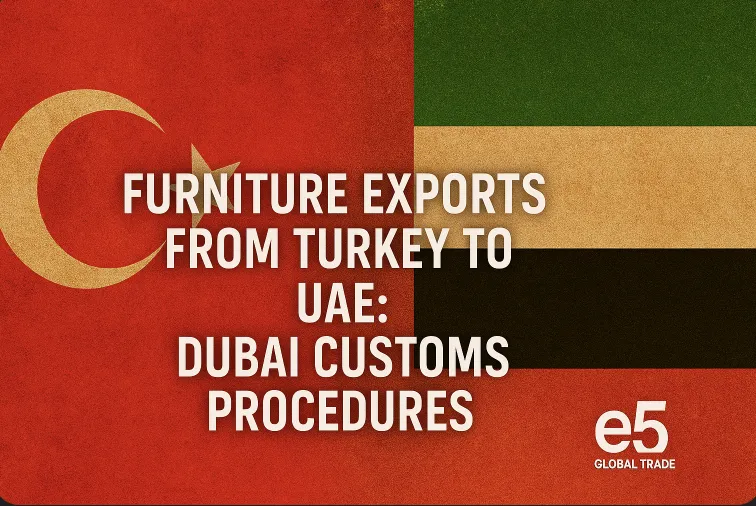For manufacturers wishing to export furniture from Turkey to the UAE, understanding Dubai customs procedures is crucial. The UAE offers an open and developed market for supplying furniture to both retail and corporate projects, particularly through Dubai and Abu Dhabi. However, the export process is more than just shipping products. Dubai Customs certifies the product's quality, packaging, and grants entry permits based on its origin. The export process involves the following steps: Certificate of Origin: Obtaining a certificate of origin approved by the Turkish Ministry of Commerce or the relevant chambers of commerce is mandatory. This document proves that the product was produced in Turkey and is one of the first documents checked during the customs process. Commercial Invoice: The invoice must include the product name, quantity, unit price, total amount, payment terms, delivery method, INCOTERMS, and complete buyer-seller information. The invoice must be prepared in English. Packing List: A packing list, including product packaging details, must clearly show the contents of each parcel. The list must include the number of parcels, gross net weight, dimensions, and product codes. Transport Document: Bill of Lading: For sea exports, the original bill of lading is issued as a BOL. This document indicates the product's transport and destination. If air transportation is used, an airwaybill (AWB) is sufficient. Customs Declaration: The product leaves Turkey with a customs declaration issued by the exporter or customs broker. The declaration includes the certificate of origin, invoice, packing list, and transport document. Dubai Customs Entry Procedure: Upon arrival at the port of Jebel Ali or Mina Rashid, the product is inspected by UAE customs. The following steps are followed: Customs Value Determination: Customs duty is calculated based on the invoice value of the product. A 5% customs duty is generally applied to furniture products. The rate may vary for some special materials. Document Inspection: Customs officials inspect the certificate of origin, invoice, packing list, and transport documents. Additional time may be requested for products without Arabic labels. Physical Inspection: Some containers are opened and subjected to physical inspection, either randomly or based on risk analysis. The product's packaging material and labeling are checked. Arabic Label Requirement: All furniture products must have Arabic labels on their packaging. The product name, material information, assembly instructions, safety warnings, maintenance recommendations, and manufacturer information must be included. Without this label, the product may be temporarily rejected. SASO or SABER Not Required: The SABER system, mandatory in Saudi Arabia for furniture products, is not valid in the UAE. However, for some projects, the buyer may request a special test report. Test Reports: UAE customs generally do not require test reports, but the buyer or project manager may specifically request a flammability test, a BS 5852 hygienic surface, or a material content report. In this case, reports must be obtained from internationally recognized laboratories. Logistics and Distribution: After clearing customs, the product is delivered to the buyer's warehouse or project site. If the Jebel Ali free zone is used, the product may remain outside customs and be distributed from there. Tip: Exporters can expedite the process by working with a local customs broker in Dubai. This broker will review the documents in advance and quickly complete customs procedures. Consequently, full compliance with Dubai customs procedures when exporting furniture from Turkey to the UAE is critical to avoiding disruptions. Preparing the correct documentation, using Arabic labels, and working with a local partner offers significant time and cost advantages. When these steps are implemented correctly, the export process can be completed quickly, smoothly, and profitably.
E5 Global Trade | Yazılar
Furniture exports from Turkey to the UAE: Dubai customs procedures
Küresel Haber Ajansı
·


